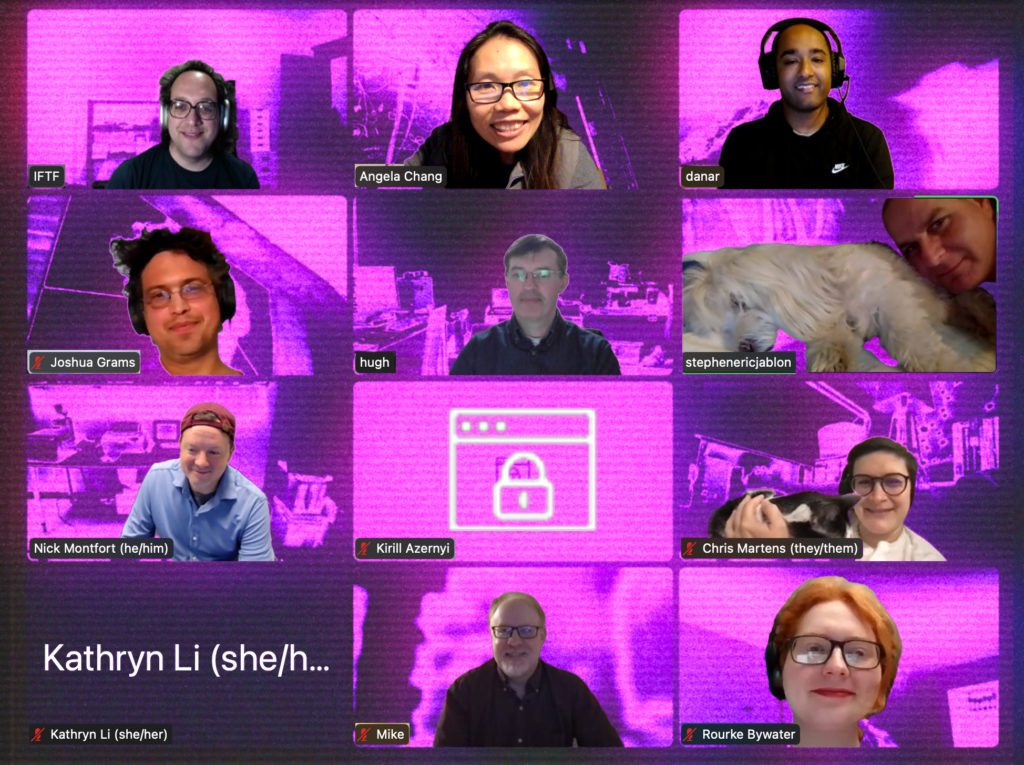
The People’s Republic of Interactive Fiction convened on Tuesday, Sept 27, 2022 over Zoom. Zarf, NickM, Dana Freitas, Josh Grams, Hugh, Stephen Eric Jablonski (+ guest dog Teala), Chris Martens (+ guest cat Nimbus) from NEU, anjchang, Kathryn, Kirill Azernyi (from Haifa), and Mike Stage welcomed newcomer Rourke Bywater from NEU. Warning: What follows is probably not proper English, but just my log of notes from the meeting to jog people’s memories.
Recap since last meeting:
- Narrascope happened. Josh and Kathryn spoke and the conference was awesome.
- Some members have moved locations (or moved in) to places, or gotten jobs. We liked to hear of everyone safe and in good places (from Russia to Haifa or NC to Boston or Boston to SF or single to with significant other). Congratulations!
- Hugh just got back from hearing Jon Ingold talk about narrative deduction mechanics at London Interactive Fiction Group. Jon also spoke at GDC recently.
- Dana is learning Spanish, and we had a short discussion about IF in Spanish.
Upcoming dates of note:
- The Saugus Halloween IF competition is upcoming Oct 21. This might be the last year unless new people volunteer to help judge.
- Rourke mentions her work with Roguelike celebration in October 22-23. https://www.roguelike.club/
- Zarf collecting donations for prizes for IF Comp tomorrow. We saw a sneak peak of the new IFcomp logo. It was very cool! Hugh is planning an upcoming IF comp entry! Go Hugh!
Discussion
We started talking about how hard it is to have new people create parser based games. How can we get students to write IF? How can platform designers “think of the students”– what considerations should there be about examples, syntax, and game creation.
Is there interest in new parser based IF engines?
Dialog is another parser based library, a Prolog-inspired IF language at https://linusakesson.net/dialog/ . Also see https://intfiction.org/c/authoring/dialog/60 on the forum.
You want something that is a little beyond just choices but not a complicated world model (compass, objects, room). Low step, high potential language would be great and is a hard problem.
Twine support innovation more easily than Inform?
Recommended reference for writing Inform–Aaron Reed’s book for a step by step learning process, but it’ a bit outdated.
It’s hard to learn examples from games would be cool to examine. e.g. fog going from room to room getting thicker. E.g. Ad Verbum. Contrast with p5.js, affordances of sharing and linking works.
Chris proposes I7.js?
Is the Z machine ecology necessary? That ecology is essential to creating IF.
You can build a homebrew (python) system of your own, but it isn’t compatible with other frameworks.
The remix-reuse template was used for infocom games.
Stephen suggests maybe a very simple programming language can be done.
Although TADs isn’t simple, it’s an alternative model.
Glulx, PunyInform stretching the interface.
Mike says the time expectations and experiences of playing IF has decreased. With Inform, one needs to invest in learning the platform. Writing for any IF platform is a long haul commitment.
Maybe ZZT-OOP https://en.wikibooks.org/wiki/ZZT-OOP language was created by Tim Sweeney or another Mud-like programming language.
Josh has been looking into visual model interface for parser interface. Zarf mentions Seitani scripting tool. His experiments with visual interfaces. It’s okay if the engine is not parser based, but then it’s something else. Chris Kline’s approach to Twine, throwing away the narrative model.
Emshort has a blog post about hybrid interfaces (e.g Brewster)
Chris interested in building a natural language interface to his language ceptre… https://github.com/chrisamaphone/interactive-lp Ceptre is very cool!
Dan Fabulich’s post on the subject and Grue script https://intfiction.org/t/announce-gruescript/52104/ Ren’Py is a success story for “use Python underneath a Domain-Specific Language”, though. So in some domains it’s possible…. Nick says his students have used it. It takes a lot of extra assets to make a visual novel but using the system is not tough for beginners.
People seemed positive about using a easy-to-learn parser interface if someone were to make one.
A Dating game with Chess Pieces was mentioned…but I’m not sure if this is the right link. LMK if you have an update or corrections!